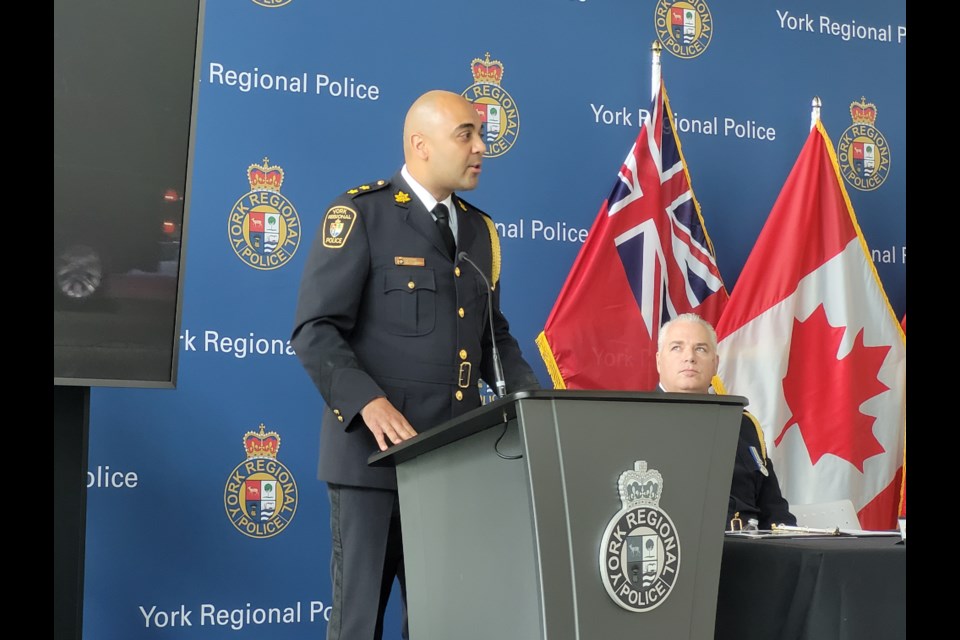Twenty-two people have been arrested and more than 400 charges have been laid following Project Monarch, a joint forces operation by York Regional Police and other Ontario agencies.
It started in October 2021 when YRP was investigating an individual believed to be trafficking drugs in the region.
"As the investigation began to progress, we identified a fairly robust criminal network surrounding this specific individual who we believe were also involved in the distribution of controlled substances, as well as firearms,” said Insp. Ahmad Salhia at a news conference at the force's headquarters in Aurora today.
Investigators believed the drugs and firearms were being trafficked into York Region and the GTA so the joint project was formed with Peel Regional Police, London Police Service, Ontario Provincial Police, Canada Border Services Agency, and Homeland Security from the U.S.
Throughout months of what police called "incredibly complex investigation," the police agencies identified a large criminal network and worked together to disrupt and dismantle it.
Project Monarch concluded on July 28. During the investigation, police issued search warrants at 22 houses, 19 vehicles, and two businesses throughout Brampton, Toronto, and London, resulting in 22 arrests and more than 400 charges laid.
These included charges for conspiracy to commit weapons trafficking, trafficking cocaine, fentanyl, methamphetamine, firearm possession related charges, and uttering death threats.
Police also seized 27 firearms, of which the origins of 20 were tracked to the United States. Serial numbers on some of the firearms were obliterated or altered to make it harder to track, but investigators believe the remaining seven will be tracked back to the U.S, Salhia said.
A large quantity of illicit drugs with a total estimated street value of $1.3 million was seized.
The most disturbing discovery among the evidence was fentanyl that had been pressed into different shapes like cars and butterflies to resemble candy, Salhia said.
“If you can imagine a young child or even an adult accidentally consuming what they believe to be candy, I can assure you that the result would most definitely be fatal,” he said.
Through the investigation, Walpole Island, a First Nation community in southwestern Ontario, was identified as a possible entry point for the illicit drugs and firearms coming into Canada.
Walpole Island is on the St. Clair River, right across from the United States. Speaking alongside the Project Monarch team, Walpole Island First Nation Chief Charles Sampson talked about the impacts on his community.
He said First Nation police services want to be effective and help fight the illicit entry of drugs and firearms into Canada through their islands and prevent them from being trafficked to other Ontario communities but they are terribly underfunded.
"We only have about nine to 11 officers in the field and we have to protect a border, an international border between Canada and the United States,” he said. “Our islands are large and they’re situated in the St. Claire River. We have one boat. What we need is a whole marine division to do the job effectively."
He called upon Premier Doug Ford and Prime Minister Justin Trudeau to provide more funding to them.
“First Nation governments, like all responsible governments, believe in peace, order and good government. Ladies and gentlemen, we need the financial resources to get this job done and I am making that demand to the federal and provincial governments to adequately resource First Nation policing services to work hand in hand with our partners to combat crime," Sampson said.
"We have to take these guns off the streets. We have to prevent the flow of illicit drugs into our communities and we have to deal with human trafficking and we have to deal with something that’s close to my heart and that is the missing and murdered indigenous woman and children and girls from our communities,” he said.



